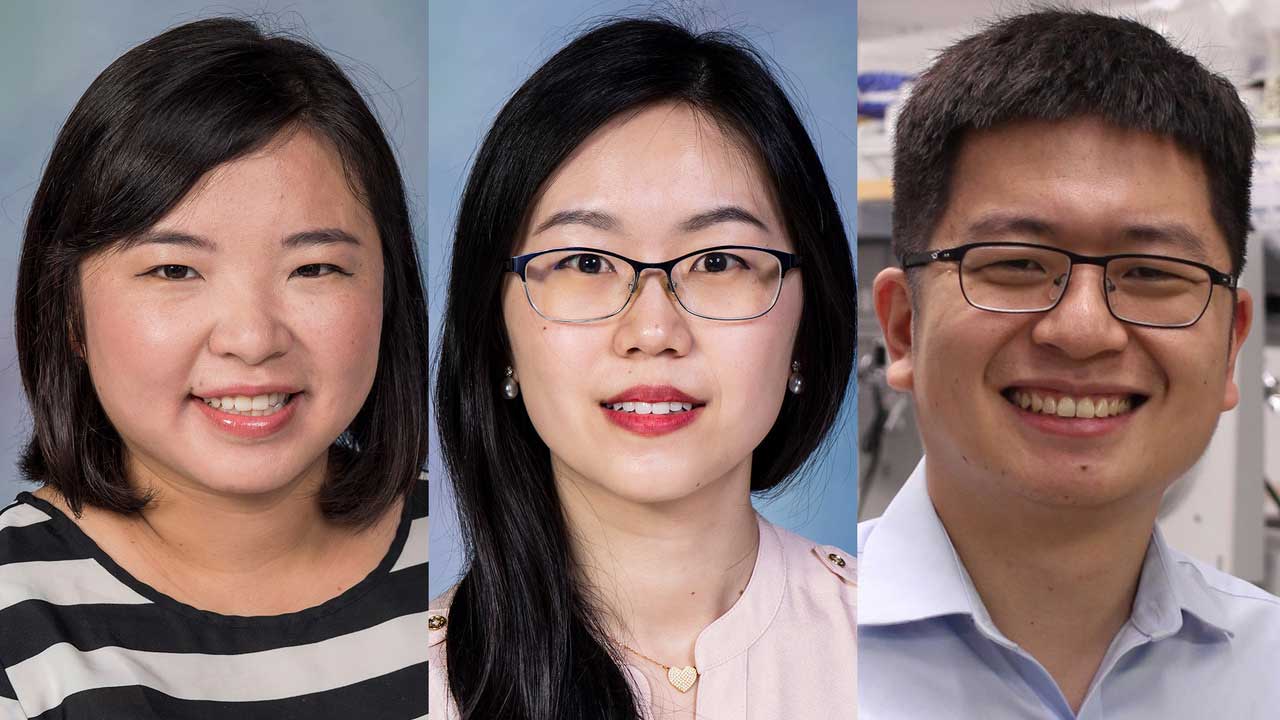Three researchers in the George R. Brown School of Engineering have received grants from the Welch Foundation to further their research.
Xue Sherry Gao, the Ted N. Law Assistant Professor of chemical and biomolecular engineering (ChBE); Yimo Han, assistant professor of materials science and nanoengineering; and George Lu, assistant professor of bioengineering and CPRIT Scholar in Cancer Research, each received a three-year, $240,000 grant.
Gao’s proposal, “Mechanistic study of the stereochemically controlled biosynthesis of fungal natural products,” has applications in drug development. Stereochemistry is the study of the arrangement of atoms forming molecules, and ways they can be manipulated.
Gao hopes to learn from enzymes found in fungi new insights into biocatalyst engineering and thus expand the number of biocatalytic tools used in the manufacture of structurally complex pharmaceuticals.
Gao earned her Ph.D. in ChBE from the University of California, Los Angeles in 2013. She was a postdoctoral associate in chemistry and chemical biology at Harvard and the Broad Institute of MIT and Harvard, and she joined the Rice faculty in 2017.
Han’s proposal is titled “Investigation of the Structural Dynamics of Voltage-Responsive Membrane Proteins.” She proposes to investigate voltage-gated ion channels (VGICs), a class of transmembrane proteins that form ion pathways activated by changes in the electrical membrane potential near the channel.
Her goal is to investigate the structural dynamics of VGICs in response to electric signals. To achieve such a controllable electrical environment will require techniques ranging from basic biochemistry to advanced nanotechnology. State-of-the-art cryo-EM combined with fluorescence microscopy and theoretical simulations will be used to determine the structure and dynamics with near-atomic resolution.
Han earned her B.S. in physics from Tsinghua University, China, in 2012, and her Ph.D. in applied physics from Cornell in 2018. After more than two years as a postdoctoral researcher in molecular biology at Princeton, she joined the Rice faculty in 2020.
Lu’s proposal involves the assembly of gas-filled protein nanostructures. He works with gas vesicles (GVs), a class of gas-filled protein nanostructures that evolved in photosynthetic microbes, which use them to float to the surface of water so they can maximize photosynthesis.
The gas compartments of GVs possess material properties distinct from normal water-filled biological tissue. Lu hopes to repurpose GVs for various biomedical applications, including using them as acoustic reporter genes to enable ultrasound imaging of gene expression. All potential applications involve noninvasively imaging and remotely controlling genetically engineered cells in deep tissue.
Lu earned his Ph.D. in biochemistry from the University of California at San Diego in 2014. He then worked as a postdoctoral fellow in the lab of Mikhail Shapiro at the California Institute of Technology, before joining the Rice faculty in 2020.
The Houston-based Welch Foundation was founded in 1954, and is among the oldest and largest private funding sources for chemistry research. It is a non-profit organization named for the industrialist Robert Alonzo Welch which advances chemistry through research grants, departmental programs, endowed chairs, visiting lectureship, scholarships and other projects at educational institutions in Texas.

